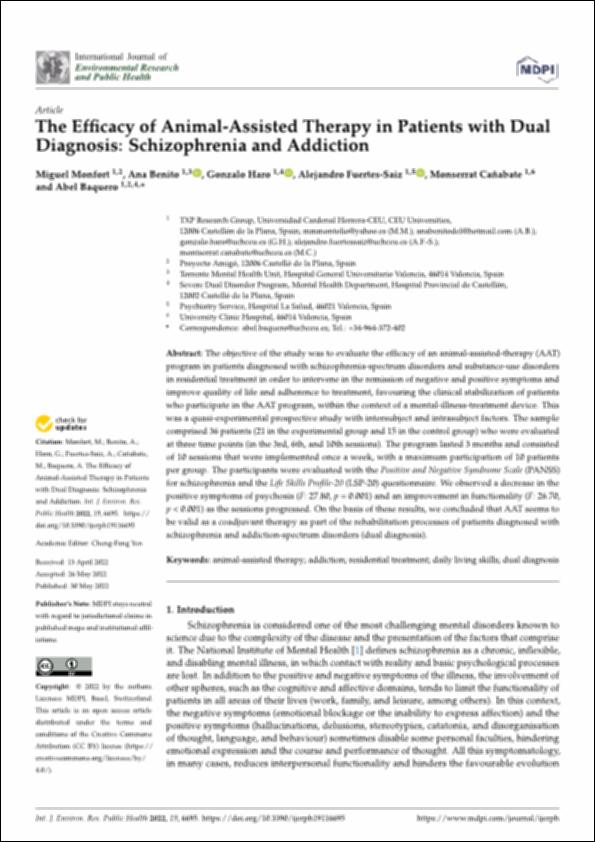Please use this identifier to cite or link to this item:
http://hdl.handle.net/10637/14226The efficacy of animal-assisted therapy in patients with dual diagnosis schizophrenia and addiction
| Title: | The efficacy of animal-assisted therapy in patients with dual diagnosis schizophrenia and addiction |
| Authors : | Monfort Montoliu, Miguel Benito Delegido, Ana Haro Cortés, Gonzalo Rafael Fuertes Saiz, Alejandro Cañabate Ros, Montserrat Baquero Escribano, Abel |
| Keywords: | Schizophrenia - Treatment.; Esquizofrenia - Tratamiento.; Psychology, Pathological.; Psicopatología.; Drug addiction - Treatment.; Toxicomanía - Tratamiento. |
| Publisher: | MDPI |
| Citation: | Monfort, M., Benito, A., Haro, G., Fuertes-Saiz, A., Cañabate, M. & Baquero, A. (2022). The efficacy of animal-assisted therapy in patients with dual diagnosis: schizophrenia and addiction. International Journal of Environmental Research and Public Health, vol. 19, i. 11 (30 may.), art. 6695. DOI: https://doi.org/10.3390/ijerph19116695 |
| Abstract: | The objective of the study was to evaluate the efficacy of an animal-assisted-therapy (AAT) program in patients diagnosed with schizophrenia-spectrum disorders and substance-use disorders in residential treatment in order to intervene in the remission of negative and positive symptoms and improve quality of life and adherence to treatment, favouring the clinical stabilization of patients who participate in the AAT program, within the context of a mental-illness-treatment device. This was a quasi-experimental prospective study with intersubject and intrasubject factors. The sample comprised 36 patients (21 in the experimental group and 15 in the control group) who were evaluated at three time points (in the 3rd, 6th, and 10th sessions). The program lasted 3 months and consisted of 10 sessions that were implemented once a week, with a maximum participation of 10 patients per group. The participants were evaluated with the Positive and Negative Syndrome Scale (PANSS) for schizophrenia and the Life Skills Profile-20 (LSP-20) questionnaire. We observed a decrease in the positive symptoms of psychosis (F: 27.80, p = 0.001) and an improvement in functionality (F: 26.70, p < 0.001) as the sessions progressed. On the basis of these results, we concluded that AAT seems to be valid as a coadjuvant therapy as part of the rehabilitation processes of patients diagnosed with schizophrenia and addiction-spectrum disorders (dual diagnosis). |
| Description: | Este artículo se encuentra disponible en la siguiente URL: https://www.mdpi.com/1660-4601/19/11/6695 |
| URI: | http://hdl.handle.net/10637/14226 |
| Rights : | http://creativecommons.org/licenses/by/4.0/deed.es |
| ISSN: | 1660-4601 (Electrónico) |
| Language: | es |
| Issue Date: | 30-May-2022 |
| Center : | Universidad Cardenal Herrera-CEU |
| Appears in Collections: | Dpto. Medicina y Cirugía |
Items in DSpace are protected by copyright, with all rights reserved, unless otherwise indicated.


